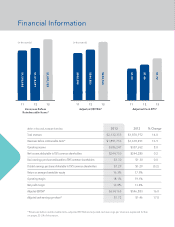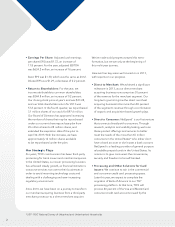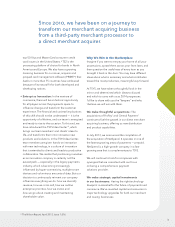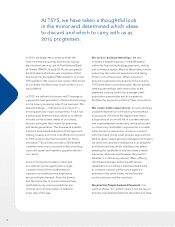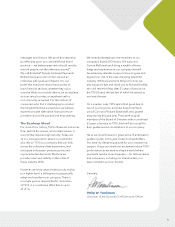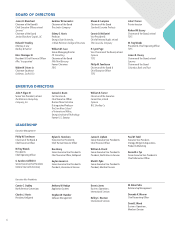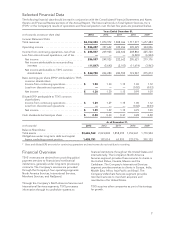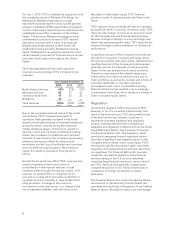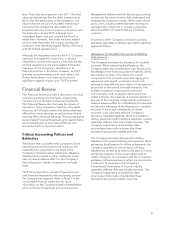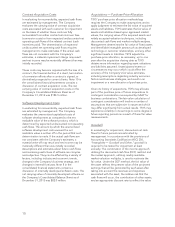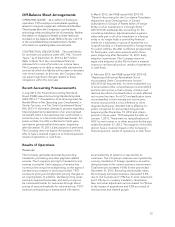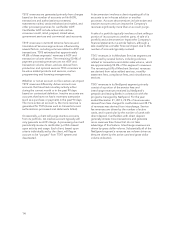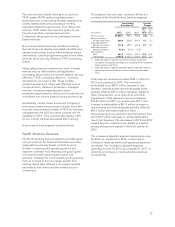NetSpend 2013 Annual Report Download - page 10
Download and view the complete annual report
Please find page 10 of the 2013 NetSpend annual report below. You can navigate through the pages in the report by either clicking on the pages listed below, or by using the keyword search tool below to find specific information within the annual report.
On July 1, 2013, TSYS completed its acquisition of all
the outstanding stock of NetSpend Holdings, Inc.
(NetSpend). NetSpend operates as a single
reportable business segment and provides general
purpose reloadable (GPR) prepaid debit and payroll
cards and alternative financial service solutions to the
underbanked and other consumers in the United
States. The products NetSpend manages provide
underbanked consumers access to FDIC-insured
depository accounts with a menu of pricing and
features specifically tailored to their needs. All
cardholder funds are held by NetSpend’s issuing
banks. NetSpend has an extensive distribution and
reload network comprised of financial service centers
and other retail locations throughout the United
States.
The following table sets forth each segment’s
revenues as a percentage of the Company’s total
revenues:
Years Ended December 31,
2013 2012 2011
North America Services . . 46% 51% 51%
Merchant Services ...... 25 27 27
International Services . . . 19 22 22
NetSpend ............. 10 ——
Total revenues ......... 100% 100% 100%
Due to the somewhat seasonal nature of the credit
card industry, TSYS’ revenues and results of
operations have generally increased in the fourth
quarter of each year because of increased transaction
and authorization volumes during the traditional
holiday shopping season. Furthermore, growth or
declines in card and merchant portfolios of existing
clients, the conversion of cardholder and merchant
accounts of new clients to the Company’s processing
platforms, the receipt of fees for early contract
termination and the loss of cardholder and merchant
accounts either through purges or deconversions
impact the results of operations from period to
period.
Another factor which may affect TSYS’ revenues and
results of operations from time to time is
consolidation in the financial services or retail
industries either through the sale, by a client, of its
business, its card portfolio or a segment of its
accounts to a party which processes cardholder or
merchant accounts internally or uses another third-
party processor. A change in the economic
environment in the retail sector, or a change in the
mix of payments between cash and cards could
favorably or unfavorably impact TSYS’ financial
position, results of operations and cash flows in the
future.
TSYS’ reported financial results will also be impacted
by significant shifts in currency conversion rates. TSYS
does not view foreign currency as an economic event
for the Company but as a financial reporting issue.
Because changes in foreign currency exchange rates
distort the operating growth rates, TSYS discloses the
impact of foreign currency translation on its financial
performance.
A significant amount of the Company’s revenues are
derived from long-term contracts with large clients.
Processing contracts with large clients, representing a
significant portion of the Company’s total revenues,
generally provide for discounts on certain services
based on the size and activity of clients’ portfolios.
Therefore, revenues and the related margins are
influenced by the client mix relative to the size of
client portfolios, as well as the number and activity of
individual cardholder or merchant accounts
processed for each client. Consolidation among
financial institutions has resulted in an increasingly
concentrated client base, which results in a change in
client mix toward larger clients.
Regulation
Government regulation affects key areas of TSYS’
business, in the U.S. as well as internationally. As a
result of the financial crisis, TSYS, along with the rest
of the financial services industry, continues to
experience increased legislative and regulatory
scrutiny, including the enactment of additional
legislative and regulatory initiatives such as the Dodd-
Frank Wall Street Reform and Consumer Protection
Act (Financial Reform Act). This legislation, which
provides for sweeping financial regulatory reform,
may have a significant and negative impact on the
Company and its clients, which could impact TSYS’
earnings through fee reductions, higher costs (both
regulatory and implementation) and new restrictions
on operations. The Financial Reform Act may also
impact the competitive dynamics of the financial
services industry in the U.S. by more adversely
impacting large financial institutions, some of which
are TSYS clients, and by adversely impacting the
competitive position of U.S. financial institutions in
comparison to foreign competitors in certain
businesses.
The Financial Reform Act, which includes the Durbin
Amendment to the Electronic Funds Transfer Act,
mandates that the Board of Governors of the Federal
Reserve System (Board) limit debit card interchange
8


